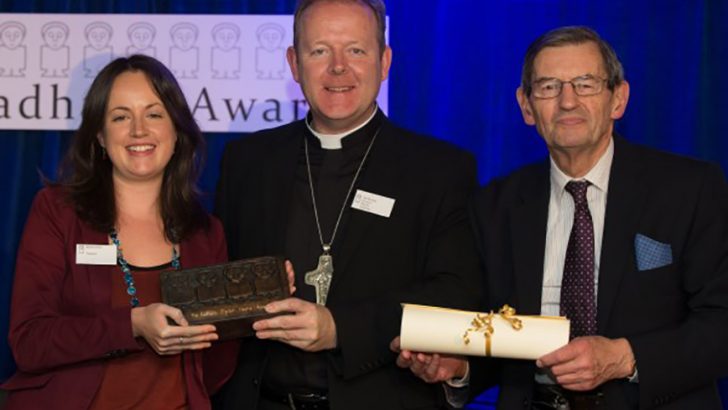Personal Profile
On July 6, Mr Peter Dunn was awarded a Papal Honour by the Archbishop of Dublin, Dr Dermot Farrell. Archbishop Farrell said the award recognised Mr Dunn’s “tireless” work for the Radharc Trust “to ensure that the Radharc programmes and the essential Christian values they embody should not be forgotten”.
Mr Dunn self-deprecatingly knocks down a suggestion that it was a reward for hard work: “I don’t know that it was that hard, it was a bit over the top as far as I’m concerned,” he says, finishing with a laugh.
After he died, I took an interest in it and I wanted to preserve and promote the archive as best I could with my limited experience”
Mr Dunn has worked for 25 years and more in promoting and preserving the archive of Radharc films. Radharc was a series numbering more than 420 documentary films produced in 75 countries between 1962 and 1996. Although the driving force behind the project was Peter’s brother, Fr Joe Dunn, Mr Dunn says that he was never involved in Joe’s lifetime, describing himself as a “silent member” of the Radharc Trust.
“He [Joe] did all the work with his own group of priests, they all worked together in making the films,” Mr Dunn explains. “When Joe died [in 1996], he didn’t want Radharc as a film company to continue, because he couldn’t get any priest that would have the knowledge of film making to take his place.
“After he died, I took an interest in it and I wanted to preserve and promote the archive as best I could with my limited experience. I was in business all my life, so I didn’t know anything about filmmaking or anything like that. I had to get other people to do all the work for me.”
In his modesty, Mr Dunn understates the work he has put in. He has led the work of digital media preservation and restoration, as well as negotiating proper care of the collection with national archives and institutions. More recently, he has encouraged new talent and challenged moral thinking through screenings, film festivals and awards including The Radharc Award at the Fresh Festival and the prestigious biennial Radharc Awards.
His praise
But most of his praise is reserved for his colleagues, including Mr Peter Kelly, formerly of Esras Films, and Ms Francis Rowe. Mr Dunn calls Peter Kelly “a great support and a fund of knowledge”.
“He made a number of Radharc films himself around the world,” Mr Dunn says. “I rely on him an awful lot for the technical side of things. But we got a lot of money from the BAI archiving funds to preserve a lot of the films. They’re not all done by any means, yet, but it got a lot of them into high definition standard. That’s ongoing work. Then we did a lot of work on the documents as well. Francis Rowe, she’s an archivist with us, and she scanned and copied all the documents from all the 420 films. That was a terrific job to have all that done, all the original scripts. All the written copies connected with the films, they were all scanned and archived.”
For many years, Mr Dunn would promote and screen the Radharc films, until he lost mobility. But he and the Radharc Trust are still looking for new ways to keep its mission alive.
“I’m looking for other ways, if anybody would be willing to show the films I’d be happy to give them DVDs of them. I have a few hundred of the DVDs made. We’re also on our website, we’re doing a lot of work, Francis Rowe and Peter Kelly are doing a lot of work putting them on Vimeo. It’s just parts of the films – there’s a bit of a copyright issue – you could pay something small to view them. That’s our ongoing work.”
When asked if he hopes someone could make something like Radharc for the modern age, Mr Dunn says that it’s unlikely.
“You wouldn’t have the money to do it today, it was a project of its time and RTÉ were willing to fund the films because they were popular and they got a good audience,” he continues. “It was one of the most popular programmes on RTÉ at its time. Nowadays, I don’t know who’d be interested in them or would put up the money – you’d want a philanthropist with deep pockets!”
We’ve one film on the lake in Galilee, we did about six films on the Holy Land”
But Mr Dunn finds the films still have the ability to entertain and inspire, and he takes pride in the positive feedback he has received in the past.
“I tried showing them in the local area and the few people that came were very interested, when they know about it and realise how well made they are and they’re very interesting,” Mr Dunn explains. “We’ve one film on the lake in Galilee, we did about six films on the Holy Land. [Journalist] Richard Crowley, he did the voice over on them and more – he was acting in them and explaining the film as it went along. We’ve one on the Holy Land and I showed that one time not so long ago and a man came up to me afterwards and he said, I know more about my religion now than ever I did. It’s a nice testimony.”
For more information, visit the Trust’s website, Radharc.ie. The Radharc awards 2021 are accepting entries until September 3.


 Ruadhán Jones
Ruadhán Jones Peter Dunn (right) with Archbishop Eamon Martin at a Radharc Award ceremony.
Peter Dunn (right) with Archbishop Eamon Martin at a Radharc Award ceremony. 